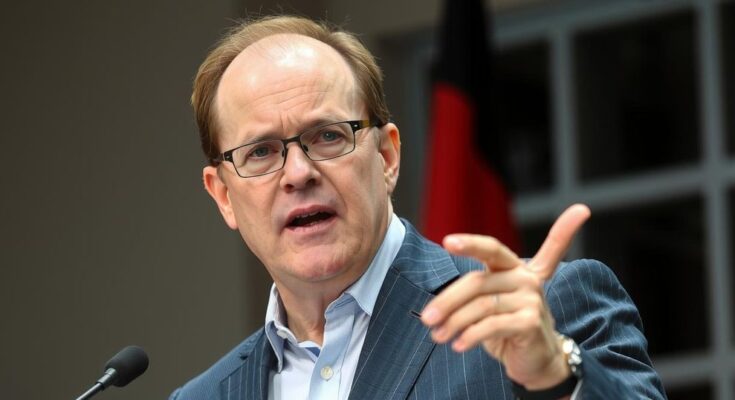Chancellor Olaf Scholz has lost a parliamentary vote of confidence, prompting early elections for February 23. This decision follows the collapse of his coalition government two months prior. Scholz aims to revitalize his party’s fortunes as polls indicate significant support for opposition parties, notably the CDU. The political landscape is characterized by increasing fragmentation, complicating future coalition-building efforts.
German Chancellor Olaf Scholz has recently lost a parliamentary vote of confidence, paving the way for early elections scheduled for February 23. This decision was deliberate, as Scholz anticipated the loss, viewing it as the most viable option to revitalize his party’s standing after the collapse of his coalition government two months prior, which left him leading a minority administration. Once reliant on the opposition conservatives for legislative support, Scholz articulated that it was now incumbent upon voters to direct the nation’s political trajectory, signaling the commencement of a potentially contentious election campaign.
Governed by the backdrop of Germany’s sluggish economy and mounting global challenges, the continuance of the current administration until the previously designated election date in September 2025 was considered untenable by many. Polls indicated that Scholz’s Social Democratic Party (SDP) was trailing significantly, with the conservative Christian Democratic Union (CDU), led by Friedrich Merz, appearing set to reclaim governmental power. According to Scholz, the upcoming snap election presents an opportunity to chart a fresh direction for Germany, advocating for substantial investments, especially in defense, although Merz cautioned that increased debt would burden future generations, proposing tax reductions instead.
Scholz’s initiative to hold a vote of confidence was deemed a “kamikaze” maneuver by some, as it is the only constitutional method through which a sitting government can dissolve parliament and call for early elections. This process was designed to mitigate political instability, reflecting the historical lessons learned from the Weimar era. Although this vote represents a constitutional formality, it also signifies deeper and more troubling issues within German politics, exemplified by the fragmentation of the party system. The collapse of the coalition, initially precipitated by financial disagreements, highlights an ongoing challenge in navigating the diverse and often conflicting ideologies within the German political landscape.
The increasing presence of the far-right Alternative for Germany (AfD) in the Bundestag complicates the stability of future coalitions, as their growing influence diminishes the share of votes available to centrist parties. As the AfD continues to gain traction, with polling figures nearing 20%, the obstacles in forming cohesive governing alliances among traditional parties grow more pronounced. Furthermore, emerging populist factions, such as the anti-migrant Sahra Wagenknecht Alliance BSW, may also disrupt the balance in parliament, amplifying the difficulties centrist entities will face in consolidating power post-election. Given the current circumstances, it remains uncertain what coalition structure will emerge as parties are wary of collaborating with the far-right and facing potential alienation from other factions.
Ultimately, the landscape of German politics appears to be shifting away from the era of stable, consensual coalitions. The forthcoming elections could therefore herald a new and unpredictable phase in governance, raising concerns about the ability to forge effective coalitions in the future.
The recent political developments in Germany revolve around Chancellor Olaf Scholz’s loss of a vote of confidence in parliament, which has initiated the process for early elections. This scenario follows the collapse of Scholz’s coalition government, leaving him at the helm of a minority administration. The political backdrop is characterized by an increasingly fragmented party system, with the rise of far-right and radical left movements complicating traditional coalition-building efforts. Scholz’s decision to call the confidence vote underscores the urgency of addressing Germany’s economic challenges and the need for a decisive electoral strategy.
In summary, Chancellor Olaf Scholz’s decision to initiate a confidence vote, resulting in a loss and subsequent call for early elections, signifies a critical juncture in German politics. The landscape is marred by fragmentation and the emergence of radical political forces, which complicate traditional coalition dynamics. As the February elections approach, the implications for governance and stability in Germany become increasingly uncertain, prompting a reevaluation of political alliances and strategies in the wake of a shifting electorate.
Original Source: www.bbc.com




